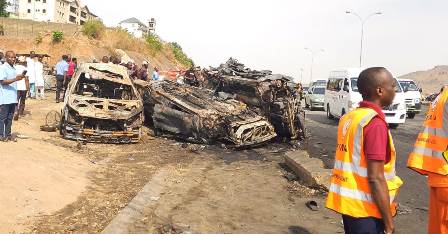Nigeria has recorded a disturbing road accident spike in 2025, resulting in more deaths and injuries, the nation’s road safety data has revealed.
Between January and March 2025 (Q1), the Federal Road Safety Corps (FRSC) recorded 2,650 crashes, resulting in 1,593 deaths and 9,298 injuries.
Compared to the same period in 2024, the number of fatalities rose by a staggering 8.3%, signaling an increase in the severity of these accidents. Injuries also jumped by 7.4% within the same period.
The first quarter of the year was marked by several tragic incidents, including containers tragically dropping from trucks on passenger buses, cars and bystanders on the roadside and fuel tanker accidentally crushing innocent people to death or igniting fire that claimed scores of lives, consuming vehicles, buildings and other goods.
Among the most deadly corridors was the Jos–Lafia–Makurdi route, where 1,539 lives were lost in the first three months of the year—a chilling reflection of the high-risk nature of certain highways.
A recall of few examples shows on January 11 (Plateau State), a bus crash left 19 dead and 11 injured; January 22 (Ilorin, Kwara), a trailer-truck collision claimed 18 lives; February 1 (Ore–Lagos Road, Ondo), two buses collided and got burnt, killing 30; and on February 14 (Kano), a collision between a trailer and a goods vehicle killed 23, injuring 48.
While full data for April to June (Q2) has yet to be released by the FRSC, early signs suggest no improvement.
A few examples will suffice: On April 19, Ife–Ilesa Road, Osun State, a collision between a trailer and a Toyota Hilux killed five people, including a child.
On May 5 (Abuja–Lokoja highway, Gada‑Biyu), a Peugeot bus tyre burst, plunging into a ditch and killing one person and six injured.
On June 1, Kano‑Zaria Expressway (Chiromawa Bridge), a bus veered off the bridge, 22 athletes were killed.
On June 7, Kyaramma, Jigawa State, a head-on collision between two Golf cars resulted in the death of nine, several others injured.
Five people died and several others were injured in an accident on Lagos-Ibadan Expressway (Soka area) involving trucks, cars and taxis.
Between July 5 and 6, a total of 39 lives were lost in three separate crashes in Kano, Lagos and Ogun states.
On Zaria–Kano highway, 21 people were killed when a Toyota Hummer bus driving against traffic collided head-on with a trailer.
In Ogun State, 10 lives were lost on the Ijebu Ode–Obada Expressway due to wrong overtaking.
In Lagos, eight people died in a crash on the Mile 2–Badagry Expressway, caused by over-speeding.
All three crashes were linked to human error: wrong-way driving, reckless overtaking, and over-speeding, some of the issues the FRSC was set up to address.
Before now, there were daily patrols on the highways by the FRSC officials (road marshals), motorists over-speeding or suspected to likely cause accidents would be flagged down, delayed or stopped outright especially if found to be drunk.
Poor road infrastructure and insecurity are other causes of accidents on the highways.
Mr. Patrick Adenusi, technical director, Safety Beyond Borders, a road safety non-governmental organisation, in a telephone chat on Wednesday, identified the major causes of accidents to include overloading by tanker drivers, use of alcohol and other dangerous drugs, and non-adherence to stipulated loading standard by oil marketing companies.
According to him, the poor condition of the highways, coupled with lack of road signage and fatigue suffered by drivers as a result of long driving time are also responsible for most of the accidents.
Many highways remain in a state of disrepair, forcing drivers into dangerous detours or risky maneuvers to make up for lost time caused by potholes or bandit-infested routes.
As Nigerians await the FRSC to release the second quarter statistics on road crashes by late July or early August, safety advocates are already warning of a potential surge in fatalities, especially during the rainy season when roads deteriorate further and visibility worsens.
Towards reversing the tide, therefore, experts have called for urgent, coordinated actions, including stricter enforcement of traffic regulations; community-level awareness campaigns on safe driving; immediate repair of damaged roads; mandatory refresher training for commercial drivers, among other measures.
©Copyright MOTORING WORLD INTERNATIONAL. All rights reserved. Materials, photographs, illustrations and other digital content on this website, may not be reproduced, published, broadcast, rewritten or redistributed in whole or in part without prior written permission from Motoring World International
Contact: editor@motoringworldng.com





